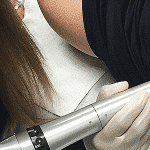It seems that every generation faces challenges in the workplace when it comes to breaking dress codes. In the ‘60s, women faced confrontation when they started wearing shorter skirts. In the ‘70s, men pushed the boundaries by growing their hair and sideburns long. The ‘80s saw young workers with new-wave hairstyles raising the eyebrows of their bosses. Nowadays it’s all about tattoos and body piercings. Although tattoos are becoming more socially acceptable, they are still posing problems in a professional environment. A recent study that appeared in the National Post found that 21% of adults in Canada have at least one tattoo and 36% of these adults are 20-31 years old. With these numbers in mind, we can conclude that many graduates who are looking for work after college or university are decorated with some form of body art. But is their ink hurting their chances of getting their dream job?
What’s so bad about tattoos in the workplace?
So why does a little colourful pigment on your skin pose such a problem in the workplace? It all has to do with the way that people with tattoos are perceived. A survey conducted by salary.com revealed that 39% of employers surveyed believe that people with tattoos reflect poorly on the company and can tarnish the company’s image. Many employers believe that tattoos can make people look unkept, no matter how they dress or carry themselves. Disapproval rates are also related to the age of the employer. Only 27% of employers who are 60 and older approve of visible tattoos in the workplace. It seems that body ink still carries the negative connotation of rebelliousness and untrustworthiness. Unfortunately for those seeking a professional career, most employers are from an older generation that still perceives tattoos in this negative light. As a result, they may have an automatic bias against you as soon as they catch a glimpse of your ink.
Different workplaces may be stronger in prejudice than others. If you’re trying to get a job in the medical field, for example, you may find that your potential employers are less accepting of your tattoos than your last employers at Starbucks were. Employers at hospitals are fully aware of how patients, especially older ones, may perceive a doctor or nurse with several visible tattoos. As unfair as it seems, tattoos are not thought to be part of a “sterile” environment and the competency of doctors or nurses who have them is often questioned by patients. Similarly, if you want a job that involves working with children, you may find that your employers tend to fall on the more conservative side. They know that some parents may be put off by a heavily tattooed person caring for their child all day. Again, it comes down to the negative connotations associated with tattoos that still exist in our society today.
Can you be rejected from a job because of your tattoos?
You may be wondering if this type of discrimination is legal when it comes to job hiring. The short answer is yes— an employer can legally choose to not hire you because of your visible tattoos. Unless your body art is part of an ethnic custom, refusing to hire you does not violate any human rights codes. Employers have the right to set dress and appearance codes and if they think your tattoos prevent you from meeting these codes, they do not have to hire you.
If, however, you get your tattoos after you’ve been hired, the situation becomes a little more complicated and depends mostly on whether or not you are working in a unionized workplace. If you get a job that doesn’t have a union, you will most likely have to follow whatever dress code rules are given to employees. So if your boss tells you to cover up your new tattoos, you’ll have to oblige. However, if your new workplace is unionized, you can fight these types of prohibitions if you think they are unreasonable. Arbitrators across Canada have consistently ruled that dress codes put into place by employers must be reasonable. That is, employers must be able to demonstrate how a person’s appearance is negatively affecting their business; they can’t just order you to cover up your ink because they don’t like the way it looks. So if your new job has a union to support you and your tattoos, consider yourself lucky.
What can you do to help your chances of securing a job?
If you are already a walking canvas and are on the hunt for a job outside of retail, there are several things you can do to increase your chances of getting the job you want. The most important thing to do is cover up any visible tattoos before you go in for an interview. If your employer doesn’t think highly of body art, you don’t want to give him or her the chance to disapprove of you before you’ve even introduced yourself. If you are successful and you get the job, it’s recommended that you still keep your tattoos hidden until you get a feel for the company and its expectations of employees. This will give you the opportunity to see if the company’s dress code is ultra-conservative, or if other employees are wearing clothes that reveal their tattoos as well. You may find that displaying small, dainty tattoos seems to be an acceptable practice, but showing off a sleeve of tattoos isn’t. Regardless of what your company’s policy on tattoos is, if you have any that would be considered offensive (curse words, nudity, etc.), it’s best to always keep them out of sight to avoid any unwanted meetings with your boss.
If you’re a recent grad and are just starting your journey into the professional world, you may consider holding off on getting any visible tattoos until you have secured a job. If you’re already decked out in ink and are discovering that your hand and face tattoos are interfering with your job search, you may want to think about getting your tattoos removed. This is a safe procedure that we offer at Advanced Laser Clinic and you may discover that it’s the right choice for you. It may take time for body art to be as widely accepted as sideburns or beards in the workplace, but hopefully a greater acceptance is on the horizon. By that time, the next generation will most likely be trying to break workplace dress codes in their own rebellious ways.







